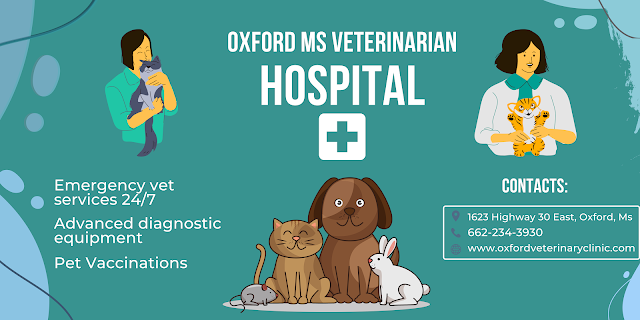Should You Take Your Pet to the Vet Every Year Or Every Two Years?
Routine visits to Veterinary Clinic will help ensure your pet lives a happy, healthy, and long life. An annual or biannual exam can catch any potential health issues early and help extend your pet’s life. Your veterinarian can detect and treat the disease early and provide treatment. Then, medication or lifestyle changes may be necessary to manage it. Your veterinarian in Oxford, MS or Best Vet in Oxford, MS, can also give you tips that will make your pet’s life easier and prevent future medical problems.
What should your veterinarian be looking for in an exam?
Although it may seem like a simple petting session, the physical exam performed by your veterinarian at Oxford Animal Care can reveal a lot of information. This is what your veterinarian at any Best Vet in Oxford, MS, will be looking for when she examines your furry friend.
Skin
Dry, itchy, or excessively dry skin can be a sign of a host of health problems, such as allergies, mange, skin infections, poor nutrition, and endocrine imbalances. The quality of your pet’s skin and hair can tell you a lot about her overall health.
Eyes
Flat-faced breeds such as bulldogs and pugs, Persians, and many other breeds can have eye problems. If their eyes are protruded, flat-faced pets can easily develop corneal ulcers. Schnauzers often get cataracts, and cocker spaniels suffer from dry eyes. If your pet has glaucoma, it will cause severe vision loss and eye pain.
Ears
Pets can get ear infections. Ear mites are common in cats, and yeast or bacterial infections can be found in dogs. However, both species can get an infection. Ear infections, if not treated promptly, can lead to inflamed, painful, and thickened ears. This makes future cleaning and treatment more difficult. Also, your veterinarian will check for any polyps or masses that may need to be removed.
Mouth
Your pet’s dental health is important. The veterinarian will check for signs such as gingivitis and lost teeth, tartar accumulation, and oral masses. Because of the spread of oral bacteria, a dirty mouth can cause damage to her heart, kidneys, and other organs.
Heart and lung
While older pets are more susceptible to heart disease than younger animals, young dogs and cats can also experience problems with their heart rhythms and function. Cardiac disease can be treated as soon as symptoms appear. These signs can often be detected by using a stethoscope and auscultation, which will allow for further testing. Many pets conceal heart disease by only showing signs such as coughing or exercise intolerance when they are more advanced. If fluid builds up, a diseased heart can cause chest crackles and wheezes.
Abdomen
While an abdominal massage may seem like a gentle belly massage, your veterinarian will be checking for abnormal mass sizes and other organs. An enlarged kidney in pets can be a sign of renal failure. A thickened bladder could be hiding a chronic infection or a tumor feeding on the spleen.
Joints, muscles, and bones
Many conditions can be treated, including gait changes, muscle loss, limping, and joint pain. Osteoarthritis is a condition that affects older pets. It causes stiffness and muscle damage from inactivity. The Cruciate cranial ligament is another common problem in dogs. It can rupture in overweight and active pets. This injury, similar to the ACL tear in human athletes, can lead to serious joint-health problems in your pet.
Your veterinarian will inspect your pet’s entire body, from nose to tail. Based on her findings, she may recommend further diagnostic testing.
Why and how many routine tests are important for your pet’s health?
Routine testing for diseases in younger pets can provide a baseline value and help to identify hidden conditions. Routine screening for common breed- or species-specific diseases is beneficial for older pets, just as people go through normal screening tests for hereditary diseases. These additional tests may be recommended by your veterinarian for your pet.
Heartworm test
Experts recommend that your pet be tested for heartworms every year to make sure they are not infected. Lyme disease and other tick-borne diseases may also be tested for in heartworm testing. These conditions can lead to serious complications if they are not treated.
Basic blood work
Many veterinarians at Veterinary Clinics in Oxford, MS recommend wellness panels for geriatric pets. However, they often start with baseline blood work for pets that are younger. Anemia, bone marrow problems, diabetes, and organ dysfunction can all be detected by blood work.
Urinalysis
An examination of your pet’s urine can reveal a lot about their urinary tract. Your veterinarian in Oxford, MS can use a small amount of liquid gold to help detect signs of infection, inflammation, kidney dysfunction, crystal formation, diabetes, and other conditions.
Fecal examination
Intestinal parasites may hide in the gastrointestinal tract of your pet, causing nutritional deficiencies. Common intestinal parasites can be identified by a routine fecal examination. Rapid deworming treatment is important to prevent parasites from growing, which can lead to diarrhea and other serious health problems.
Pets, especially cats, are great at hiding signs of illness, so it is important to have a thorough exam and routine screening tests. A wellness visit can help prolong your pet’s lifespan and give you more time with your pet.



Comments
Post a Comment